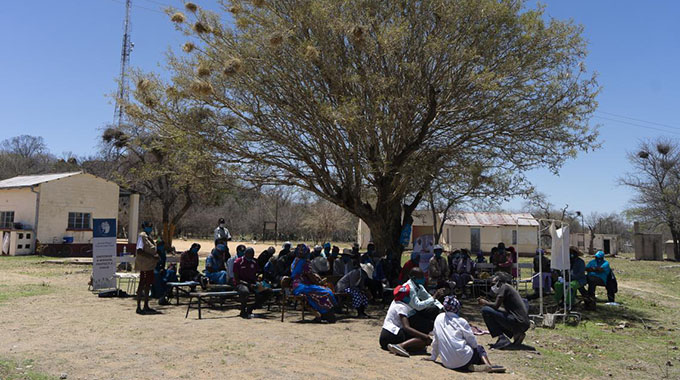Grass roots community action tackles SGBV, COVID-19 in Matabeleland South

Features Correspondent
A thatched market on a roadside in Umzingwane, along the Bulawayo -Gwanda highway in Matabeleland South Province has become an important community meeting point where issues and solutions are discussed.
Under the market shed, community members, mainly women, use vending stalls to display their wares that include fruits, face masks and other items. Posters on COVID-19 information are also plastered on the walls making information readily available to the community.
On this sun-drenched afternoon, the Apostolic Women’s Empowerment Trust (AWET) met with over 20 behaviour change facilitators (BCFs) to discuss Sexual and Gender Based Violence (SGBV), child marriages, poverty, gender relations, and COVID-19 preventative measures among other critical issues.
Support, from village heads and other stakeholders at the meeting, proved the community was not alone in the quest to find solutions.
Apostolic and other religious populations are prominent in Zimbabwe. Fully aware that apostolic sects have various beliefs, norms and values, and perceptions on key social issues such as child marriages, education, HIV and AIDS and maternal health – AWET has been advancing dialogue and understanding of gender issues.
Using direct community engagement activities, AWET communicate SGBV at the household level, as well as offering reporting mechanisms such as toll free numbers, and referral pathways.
Issues like child marriages, poverty, domestic violence, extra marital affairs, dressing and its impact on SGBV topped the list as participants responded to various questions and tasks by the AWET field officers.
A behavior change facilitator, Samantha Ncube (22) of Nhleyiyana Village said early child marriages were a challenge she was determined to end.
“Some girls want to be married to older men to escape poverty. These men already have wives. There is also peer pressure among young people who just love fancy things,” said Samantha.
“Some families also pledge their children to older men. My role is to educate and also to refer the abused to the police, social workers and other partners,” she said.
Such a responsibility is not new to Samantha who began peer educating in 2016 while she was still a student at Mawabeni Secondary School. The education from AWET adds to her experience especially now that there are emerging issues as a result of COVID-19.
AWET field officer Nonkazimulo Sibanda said that so far, they have trained behavior change facilitators in some parts of Umzingwane, an area common with gold panners and many apostolic churches.
“It is the hot spot in this district. There is a lot of early child marriages, SGBV and GBV. We are going to train BCFs to help in curbing this problematic community issue,” she said.
Sibanda is excited about the impact of the training.
“Young people are joining the trainings. We now have more than five young volunteers who help here. The young people are willing to become BCFs and are involved at grassroots level, in villages and are teaching in communities.”
The feedback of the programme has been positive with communities engaging freely and contributing in finding solutions.
“People are opening up. They are actively giving us helpful suggestions to improve the programme,” noted Sibanda.
At Dombodema Clinic, Bulilimamangwe District also in Matabeleland South Province, AWET is also educating more behavior change facilitators.
Under a huge tree, they discuss solutions to problems they have identified around SGBV, GBV, child marriages.
Here, more men are willing to participate in the three-day training of BCFs where the recurring issues around SGBV take centre stage.
The Spotlight Initiative
AWET Head of Programmes, Hope Dunhira said Umzingwane and Bulilimamangwe are among the 27 districts they are working with under the Spotlight Initiative.
“AWET has trained 47 behavior change facilitators in Umzingwane and we are now working within the communities to sensitise and cascade information on issues to do with SGBV and GBV,” she said.
Closely looking at best practice, AWET has gone a step further to ensure the behavior change facilitators become “information kiosks” around a range of issues within their communities.
She said cases of GBV and SGBV increased during the COVID-19 lockdown increasing problems associated in areas where illegal gold mining is occurring.
“In most areas children are going where gold panning is being done. The girl child is going out there to sell wares because there is a lot of hunger within the family due to COVID-19. Children go to the gold panning sites where they end up being sexually violated,” she said.
Community engagement through Behavior Change Facilitators is key
Community engagement, empowerment and partnerships through the behavior change facilitators remains critical.
Hope Dunhira said they have also empowered vulnerable communities through feedback mechanisms introduced in the communities as our way of showing accountability.
“We have introduced the toll free number 08080443, where people can call if there is any issue they feel they cannot directly report within their communities for fear of victimization,” she said.
From the information AWET has received so far from the BCFs, there was an improvement in the way cases are being handled.
Hope attributed this in part to the accessibility of the toll free number.
Additionally, coordination with other stakeholders has improved in the areas where the Spotlight Initiative is.
AWET has been working with other stakeholders from the Police Victim Friendly Unit; Ministry of Women Affairs, Community, Small and Medium Enterprises Development; Ministry of Health and Child Care, and from the Ministry of Youth, Sport, Arts and Recreation among others.
This, Hope added, shows that coordination within the areas covered by the Spotlight Initiative has improved.
“We are grateful because line ministries are giving us the support that we have always wanted within these communities. We have also been receiving information and even calls from the toll free number where the community is appreciating the work that the Spotlight Initiative is doing.”
She said UNICEF support in terms of resources has been tremendous.
“We have not lagged in terms of information, education, and communication materials when we come into the community. With such support even within the communities we are working in, line ministries have also been in a position to support us.”
Global partnership to fight violence against women and girls
A global partnership to eliminate all forms of violence against women and girls, The Spotlight Initiative is funded by the European Union (EU). It is being implemented by UNDP, UNICEF, UN Women, UNFPA, UNESCO, and the ILO in Zimbabwe.
Co-chaired by the UN Resident Coordinator’s office and the Ministry of Women Affairs, Community, Small and Medium Enterprises Development, the Spotlight Initiative also has a national civil society reference group to promote stakeholder accountability and civil society engagements.- UnicefZimbabwe









Comments